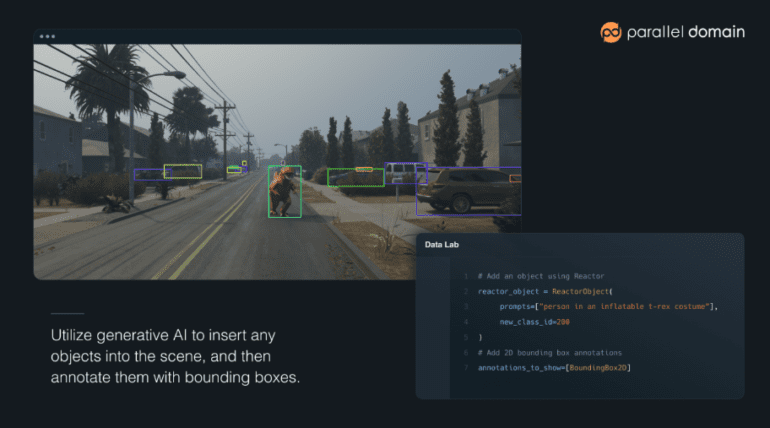TL;DR:
- Parallel Domain introduces Data Lab API, enabling customers to generate synthetic datasets using generative AI.
- Machine-learning engineers gain control over dynamic virtual worlds to simulate various scenarios.
- Data Lab allows engineers to generate new objects not previously available in the asset library.
- The API utilizes 3D simulation to overlay real-world randomness onto the virtual environment.
- Autonomous driving companies can benefit from more efficient and faster dataset creation.
- Data Lab’s self-serve API enables customers to generate datasets in near real time.
- Synthetic datasets outperform real-world datasets in certain scenarios, improving model performance.
- Parallel Domain leverages foundation models to develop custom technology for object labeling.
- The reactor, the company’s synthetic data generation engine, is now available through Data Lab API.
- Parallel Domain plans to transition to a software-as-a-service (SaaS) model, offering subscription-based access.
- The API has the potential to impact industries beyond autonomous driving, such as agriculture, retail, and manufacturing.
Main AI News:
In a groundbreaking move, Parallel Domain, the San Francisco-based startup, is democratizing the power of synthetic dataset generation by introducing Data Lab, an innovative API that leverages the capabilities of generative AI giants. With Data Lab, machine-learning engineers now possess the means to command dynamic virtual worlds and simulate an extensive array of scenarios with ease.
Kevin McNamara, the visionary Founder and CEO of Parallel Domain, shared the company’s vision, stating, “All you have to do is go to GitHub, install the API, and then you can start writing Python code that generates datasets.” This revolutionary offering empowers engineers to create objects that were previously unavailable in the startup’s asset library. By utilizing 3D simulation, the API lays the foundation for engineers to overlay the randomness of the real world through simple prompts. Imagine training your model to navigate a highway with a flipped-over cab obstructing two lanes or teaching your robotaxi to identify a human sporting an inflatable dinosaur costume. With Data Lab, these feats become attainable realities.
The ultimate goal is to grant autonomy, drone, and robotics companies unparalleled control and efficiency in constructing extensive datasets. By doing so, they can accelerate and deepen the training of their models. McNamara highlighted the significance, noting, “Iteration time now goes to essentially how fast can you, as an ML engineer, think of what you want and translate that into an API call, a set of code? There is a nearly infinite, unbounded level of stuff a customer could type in for a prompt, and the system just works.”
Among the esteemed clientele of Parallel Domain are major original equipment manufacturers (OEMs) involved in the development of advanced driver assistance systems (ADAS) and autonomous driving solutions. Traditionally, it could take weeks or even months for the startup to create datasets based on specific customer parameters. However, with the introduction of the self-serve API, customers can generate new datasets in “near real time,” as McNamara affirmed.
On a broader scale, Data Lab has the potential to expedite the advancement of autonomous driving systems significantly. McNamara shared that the startup conducted tests using synthetic datasets of strollers, comparing them against real-world datasets. Surprisingly, the model trained on synthetic data outperformed its real-world counterpart. This exciting finding highlights the immense value of Parallel Domain’s groundbreaking technology.
Although Parallel Domain does not directly utilize popular OpenAI APIs like ChatGPT, it builds upon the foundation laid by the remarkable large-scale models that have been open-sourced in recent years. Stable Diffusion, for instance, enables the company to fine-tune its versions of these foundation models and utilize text input to drive image and content generation. McNamara emphasized that his team has developed custom technology stacks to label objects during the generation process, further enhancing the system’s capabilities.
Initially introduced for internal use and beta testing with trusted customers, Parallel Domain’s synthetic data generation engine, Reactor, has now made its way to customers through the Data Lab API. This shift in the company’s business model signals a transition towards customer preferences for convenient access to generative AI. In the current commercial strategy, customers purchase data allotments and utilize credits throughout the year. However, with Data Lab, Parallel Domain envisions adopting a software-as-a-service (SaaS) model, allowing customers to subscribe and pay based on their usage of the platform.
Furthermore, the API holds immense potential for Parallel Domain to expand its reach into various domains where computer vision-driven technology is revolutionizing industries. From agriculture and retail to manufacturing, the enablement of AI is poised to enhance efficiency. McNamara expressed the company’s ambitions, stating, “We want to chase those use cases and eventually have a platform where, regardless of the domain you operate in, if you need to train an AI to perceive the world through sensors, Parallel Domain will be your starting point.“
Conclusion:
The introduction of Parallel Domain’s Data Lab API marks a significant milestone in the market, providing businesses with the tools to leverage generative AI for synthetic dataset generation. This empowers machine-learning engineers to create dynamic virtual worlds and simulate diverse scenarios, improving efficiency in training models. By offering near real-time dataset generation and the potential for improved performance, Parallel Domain is positioned to disrupt the market and expand into various industries beyond autonomous driving. The shift towards a subscription-based model further enhances accessibility, making generative AI more readily available to businesses across domains. This technology heralds a new era of innovation and efficiency in the field of AI-driven solutions.

